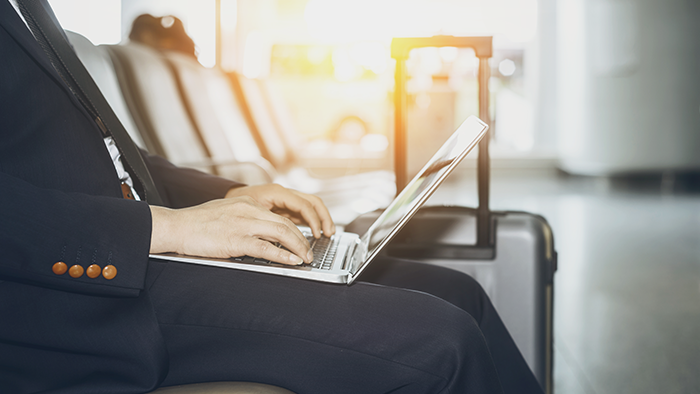What are secure messaging apps?
Secure messaging apps use encryption to keep the contents of communications private and prevent unauthorized parties from accessing your chats and calls. The most secure messaging apps use end-to-end encryption, ensuring that only the message sender and recipient can see the correspondence.
A secure messaging service with encryption protects your data and boosts your overall privacy. If you’re using an unencrypted messaging app, your communications could be exposed to the company running the app, advertisers, and hackers — not to mention what could happen in the event of a data breach. Your private information could even be sold online or used for identity theft and other cybercrimes.
With so much personal data stored on your phone, it’s an open target for attacks. Protect yourself by learning the signs of phone hacking, securing your devices with strong passwords, and using one of the best password managers to keep track of them all.
If you're concerned about a family member or someone else using your phone and seeing certain apps, you can also hide apps on your Android or iPhone to enhance your privacy.
How to choose a secure messaging app
There’s a variety of encrypted messaging apps out there. But beware: Some supposedly secure messaging apps are actually fake apps, while others don’t adequately protect your data. The best encrypted messaging apps all contain essential features to keep you safe.
When choosing a private messaging app, make sure it has these key features:
-
Open-source code
When an app’s source code is available to the online community, it ensures that the app is put through more security tests. Also, it’s regularly checked for bugs and other vulnerabilities that may cause a malware infection.
-
Encryption
Your data is highly sought after by cybercriminals and advertisers. The best encryption software makes sure your personal data stays private. A secure messaging app offers end-to-end text encryption to enforce privacy.
-
Privacy policy
If you care about your privacy, make sure the companies providing your apps do too. A secure messaging app adheres to company policies that respect your privacy and protect your data.
-
Responsible data collection
Though many secure messaging apps use encryption, they can still collect metadata about you, including device info, your IP address, and geolocation. The most secure apps don’t collect this information, or they let you easily opt out of data collection.
 Secure messaging apps use encryption to keep communications private.
Secure messaging apps use encryption to keep communications private.
The best encrypted messaging apps for your phone
We’ve rounded up the top contenders for the best secure messaging service. When compiling our list, we considered key security benefits as well as features, usability, price, and more.
Here’s our list of the best encrypted messaging applications:
-
WhatsApp
-
Telegram
-
Signal
-
Threema
-
iMessage
-
Facebook Messenger
-
Viber
-
Line
-
Wickr Me
-
Google Messages
WhatsApp
The world’s most popular standalone chat and voice app, WhatsApp has over two billion monthly active users. WhatsApp is a great way to jump into the encrypted messaging app game, because many of your contacts most likely already use it.
WhatsApp uses end-to-end encryption and allows encrypted backups of all your chats. Also, it doesn’t store messages on its servers. Plus, WhatsApp offers two-step verification, requiring a PIN to verify your phone number on any device. And since the app uses a limited amount of background data, you may save on your phone bill.
A drawback to some is that WhatsApp is owned by Meta (formerly Facebook). WhatsApp shares information with other Meta companies, so your data could be used for targeted advertisements. Also — perhaps due to its wide usership — WhatsApp has been used as a platform for spam text messages and even spyware attacks.
 Pros:
Pros:
 Cons:
Cons:
-
Owned by Meta
-
Data sold to advertisers
Telegram
Telegram works similarly to WhatsApp and other secure text apps. It lets you message and call other Telegram users, have group chats, and send files. Telegram features a smooth, intuitive interface that’s especially great for group messaging (up to 20,000 participants!). Beyond messaging, Telegram is also a popular social media platform.
Telegram is cloud-based, so it stores all your messages and pictures on a secure server. This lets you access your data on any connecting device, on a variety of platforms. However, this also leaves your data vulnerable if their servers are breached.
Although Telegram features end-to-end encryption, it’s not by default. Encrypted messages are only enabled in the “secret chats” mode. In this mode, Telegram will also stop storing your data on their servers.
 Pros:
Pros:
-
Intuitive interface, especially for group chats
-
Multi-platform friendly, with easy data syncs
-
Free
 Cons:
Cons:
Signal
Considered one of the most secure messaging apps on the market, Signal protects your communications with end-to-end call and text encryption. Its encryption protocol is so secure that other leading apps like WhatsApp and Facebook messenger use it too.
Like other apps, Signal features messaging, calls, video chats, and file and photo sharing. It also allows disappearing messaging for extra privacy. You need a phone number to sign up, and we recommend securing the app with a password. For the security-minded, all your data is stored locally on your device — not on remote servers.
Signal is not owned by a Big Tech company — instead, it’s open source and funded by grants and donations. Unlike other private messaging apps, Signal has no ads, affiliates, or secret tracking — no need to fuss with a do not track option. Plus, its open-source status means the app goes through continuous security audits to make it even more secure.
 Pros:
Pros:
 Cons:
Cons:
Threema
Threema is an open-source, totally encrypted messaging app whose company headquarters are in Switzerland. Like other apps, it features messages, voice and video calls, and group chats. But unlike its competitors, Threema does not require a phone number or email to use, making it one of the best secure messaging apps for anonymity.
Threema emphasizes protecting metadata. It permanently deletes a message from its servers after it’s delivered. To limit eavesdropping, Threema prefers managing information locally on user devices rather than servers.
The downside for the powerful security Threema provides is that it’s not free. Also, the app has yet to catch on outside the German-speaking world.
 Pros:
Pros:
 Cons:
Cons:
iMessage
Apple’s iMessage is a secure messaging service exclusively for Apple platforms: iOS, macOS, iPadOS, and watchOS. It offers end-to-end encryption between users, however it can also handle unencrypted SMS text messages.
Data in iMessage can be backed up to Apple’s cloud storage platform iCloud. Though it’s a convenient way to transfer and store data, iCloud is vulnerable to hacks that could compromise your private data.
And though your messages are encrypted, phone numbers and contact lists are listed in plain text. Plus your metadata is not encrypted — leaving hackers an opening to access your device. To stay safe on iOS while using iMessage, use the best privacy and security apps for iPhone.
 Pros:
Pros:
 Cons:
Cons:
-
Also handles encrypted SMS text messages
-
Encryption limited to messages
-
Only available for Apple products
-
iCloud backups can put data at risk
Facebook Messenger
Facebook Messenger is a hugely popular secure messaging service, owned by the social media tech giant, Meta. It has a familiar interface that features one-to-one messaging, group messaging, stickers, photos, file transfers, and voice and video calls. It also has a disappearing message feature.
Facebook messenger features end-to-end encryption, but it’s not enabled by default. You need to use the secret conversations feature for a message encryptor.
In terms of privacy and security, the Facebook app and Meta have a spotty reputation. They gather personal data about you and have been involved in some high-profile data scandals in the past. You can download your Facebook data to see what they know about you.
 Pros:
Pros:
 Cons:
Cons:
Viber
Viber is one of the more feature-rich encrypted messaging applications available. Along with standard messaging and voice and video calls connected to your phone number, it features disappearing messages and hidden chats. Viber also includes some fun AR filters and stickers for your photos.
You can also sync Viber across your desktop and mobile devices for easy accessibility.
Viber uses end-to-end encryption and features a unique color-coded indicator to show you a conversation’s level of protection. Green means the chat is encrypted and the contact is trusted. Gray means the chat is encrypted but the contact has not yet been marked as trusted. Red indicates the contact can’t be authenticated.
Viber doesn’t have as extensive a user base as some other secure chat apps on our list, so a lot of your contacts may not be on the app. And you need to pay a fee when calling non-Viber numbers.
 Pros:
Pros:
-
End-to-end encryption
-
Lots of secure and fun features
-
Syncs across desktop and mobile
-
Color-coded security indicator
 Cons:
Cons:
Line
Line was created in the wake of the 2011 Tōhoku earthquake and tsunami in Japan. After the disaster disrupted normal means of communication, the internet company Naver created the app for its employees. Once opened to the public, Line spread in popularity throughout Japan and the rest of Asia.
Line offers standard messaging, voice and video calls, and file sharing. But the fun extras set it apart. Virtual stickers, animated emojis, games, and even a taxi-ordering tool. The app also has end-to-end encryption, but not by default.
Though a fun and secure app, Line has yet to catch on outside of Asia. You can register to use the app with your phone number or your Facebook login.
 Pros:
Pros:
 Cons:
Cons:
Wickr Me
Founded by a group of security experts and advocates, Wickr Me is one of the best private messaging apps for anonymity. It’s designed to send auto-destructing text or voice messages, photos, or videos to other users. And it doesn’t require an email or phone number to sign up.
Wickr Me features powerful end-to-end encryption and deletes metadata like geolocation info and message times. And it’s an open-source technology, so it goes through rigorous security audits to make sure vulnerabilities are uncovered. It also boasts some unique security features like video verification: users verify each other with short bursts of encrypted video.
Though very security-focused, Wickr Me is not as popular as other apps. It was initially designed for businesses and other enterprises, and its premium features are not free.
 Pros:
Pros:
 Cons:
Cons:
Google Messages
This private messaging app comes standard with Android phones. Google Messages uses the new RCS (rich communication services) protocol by default. Safer than SMS, RCS can handle payments, high-res photos and file sharing, location sharing, video calls, and other features.
On top of that, Google Messages has end-to-end encryption by default. Plus, it’s open-source technology so it’s regularly tested for vulnerabilities that may turn into security exploits.
Though you can access Google Messages through a web browser, you can only use the RCS protocol with other Android devices. It’s not likely iOS will be added since Apple has yet to embrace RCS technology.
 Pros:
Pros:
 Cons:
Cons:
Get a VPN to secure all your online communications
A secure messaging app may protect the messages you send and receive while using the app, but what about the rest of your online activity? A VPN like Avast SecureLine VPN creates a secure tunnel to encrypt all your communications. That way, you don’t have to worry about the particular protection offered by an individual app, because all your messages and data are protected.
 A VPN provides an encrypted tunnel to secure your messages and other communications.
A VPN provides an encrypted tunnel to secure your messages and other communications.
Get power protection against hackers and secure your communications from your ISP and other snoops. Avast SecureLine VPN hides your online activity and helps protect you from today’s myriad online threats — especially when you’re on public Wi-Fi. Plus, with lightning fast connection speeds, you can access content and stream all your favorite shows. Install Avast SecureLine VPN right now.
FAQs
What messaging app is the most secure?
According to our privacy experts, Signal is probably the most secure messaging app. Its open-source encryption protocol has become the industry standard for end-to-end message and voice encryption. And Signal is funded by donations and grants, so it isn’t incentivized to monetize data.
Wickr Me is also one of the most secure messaging apps that’s also free. It uses end-to-end encryption and is open source. Wickr Me deletes your metadata, like geotags and message times. It features disappearing messages, and you don’t need a phone number or email address to sign up.
What is the most secure messaging app in 2023?
Overall, Signal is likely the most secure messaging app in 2023, considering the strength of its security features, the power of its end-to-end encryption protocol, and its open-source code base. It features disappearing messages and can be secured with a password. Recent updates have made Signal even more feature-rich and user friendly.
Is Telegram the most secure messaging app?
Telegram is not the most secure messaging app. Telegram does not use end-to-end encryption by default — you’ll have to switch to its secret chat mode. Plus it uses its own MTProto encryption protocol, which, though it hasn’t been cracked, is not as proven as other protocols.
What texting app is not traceable?
Threema is nearly untraceable. It uses encryption, open-source technology, and doesn’t require an email or phone number to sign up. It protects your metadata and permanently deletes messages after they’re sent. Of course, we can’t guarantee that Threema is completely untraceable, and you can use a sniffer to monitor internet traffic and check for yourself.

 Secure messaging apps use encryption to keep communications private.
Secure messaging apps use encryption to keep communications private. A VPN provides an encrypted tunnel to secure your messages and other communications.
A VPN provides an encrypted tunnel to secure your messages and other communications.










